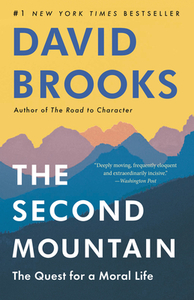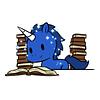Take a photo of a barcode or cover
emotional
informative
inspiring
reflective
slow-paced
David Brooks drives me freaking nuts, but when I read the description for the book I decided it was worth reading, and prepared myself to hate it. While it was preachy at times, maybe it was just the sermon I needed to hear--right book at the right time. I love his overarching message of relationalism and interdependence and the problems with hyperindividualization, and I think the best moments of his books are where he does the best job tying the anecdotes/stories into that overall theme. The religion and community parts were my best, as was the beginning metaphor with the first vs second mountain.
Overall, it was the book I needed to read this month. I don't know if it's something I could just return to time and time again.
Edit on second read: I read it again, so...
Overall, it was the book I needed to read this month. I don't know if it's something I could just return to time and time again.
Edit on second read: I read it again, so...
This was such a strange book. The first section was enjoyable, but having read much of the material he drew from there wasn't much new for me. It fit with the title, of a second phase of life where one stops focusing on building up ones personal life and career, and moves on to helping others in community. Then he moves on to highschool and college students finding something meaningful to do in their lives, and although that part was interesting, it just didn't fit with the start of the book. Then he spends a lot of time discussing how to have a good marriage and some sort of faith, with lots of details about his own personal life. Both were interesting, but still, felt disjointed from the other parts of the book. It ends with a commitment to community and a list of admirable people that his organization discovered and then a long numbered list of things we should commit to to be a "good" person. Each piece was interesting, sometimes overbearing, but for someone who has been writing for so long, I would have expected this to be more coherent and less like a list of interesting facts, quotes and articles he gathered.
While I found what he said about communities interesting and insightful, a majority of this book felt steeped in unacknowledged privilege. It romanticizes some utopian society where people are more integrated in each other's lives without exploring how that would work in such a diverse society. Many people choose to be hyper individualistic because they spent their formative years as part of a interconnected society that did not accept them as they are and wanted them to conform to a specific ideal.
Also, I felt the middle parts were just autobiography as "the best way" instead of a sociological examination of society. The religion piece especially felt like "this is how I've gone through my journey, so it's the right way". It didn't sit well with me, which is probably why it took so damn long to read it.
Also, also, he flippantly refers to mental illness and dismisses that it is caused by chemical imbalances in the brain, but rather it's because society isn't the same as it was in the 1930s. I not-so-calmly closed the book and threw it across the room before ignoring it for a few days.
Dear future self, please don't feel inclined to read nonfiction books just because someone you admire quotes/is seen carrying it. Normally it will annoy you and you're never going to meet the person you admire so you can argue with them about it. Sincerely, current self.
Also, I felt the middle parts were just autobiography as "the best way" instead of a sociological examination of society. The religion piece especially felt like "this is how I've gone through my journey, so it's the right way". It didn't sit well with me, which is probably why it took so damn long to read it.
Also, also, he flippantly refers to mental illness and dismisses that it is caused by chemical imbalances in the brain, but rather it's because society isn't the same as it was in the 1930s. I not-so-calmly closed the book and threw it across the room before ignoring it for a few days.
Dear future self, please don't feel inclined to read nonfiction books just because someone you admire quotes/is seen carrying it. Normally it will annoy you and you're never going to meet the person you admire so you can argue with them about it. Sincerely, current self.
I made it through more than half the book, and as someone struggling with defining myself after knocking myself off the first mountain, I really connected with the first two parts of this book. Things started going downhill for me in the marriage section, and then I skimmed the religion section, and I couldn’t even motivate myself to read the final section on community. His thoughts on marriage seem a bit out of touch, and I feel like he sets up false dichotomies—in particular marriage as suborning yourself to this greater thing you create with your spouse, and as being opposed to self-actualization. Typically this ends up looking more like the woman suborning herself so the man can self actualize. As a related aside, a half hour after reading his Jerry Maguire “you complete me” description of marriage, I read a Psychology Today article that referenced the same idea and pointed out the absurdity of the suggestion that individual spouses in a marriage are not complete people. We bring our complete selves to a marriage and create something new.
Brooks and I share many of the same heroes, such as Dorothy Day, Augustine, Jean Vanier, Wendell Berry... the list goes on and on. I enjoyed the book, though some sections slogged on. Overall, I’m a fan of his message of commitment and what matters in life. I teach many of these type lessons in my Theology class, so I’m sure I’ll find ways to integrate the book into my teaching.
I am a David Brooks fan, so I was a little disappointed. I believe Mr. Brooks has gone through some major shifts in his life in the past decade. This book came across a bit like a gospel reformed smoker or alcoholic, or maybe a born again.b Christian .He described the destination, but gave little insight into how one might get there.
hopeful
inspiring
slow-paced
Such an amazing message. I want some of these principles to guide me for the rest of my life. However I could not stand the length and pace. It was way too long at some points and way too short at others. But if you’re looking for an inspiring new perspective on life that is counterculture, I would still recommend it.
inspiring
reflective
medium-paced
Glad I persisted with this book. Didn't end up being what I thought it was when I picked it up, it's more autobiographical than anything else. At the beginning he says "This book is... part of my continual effort to write my way to a better life. "
And he largely does that. And we go on that journey. And that made it suprisingly endearing.
And he largely does that. And we go on that journey. And that made it suprisingly endearing.



